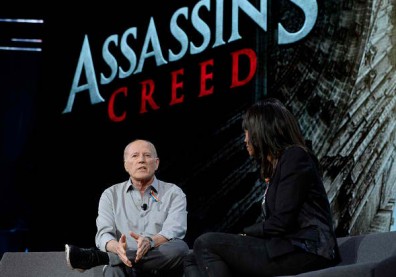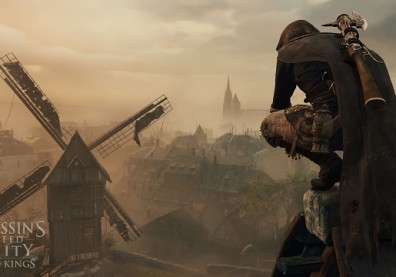Anyone could have guessed that people like Napoleon, Robespierre and the Bourbon royal family would be showing up in Assassin's Creed Unity. But Ubisoft has released some details about other historical figures you'll meet as Arno that weren't necessarily predictable. You might not know their names, but you're definitely familiar with their work.
Unity's Massive AI Requirements Mean That The Game Will Run At 900p And 30fps
Antoine Lavoisier is a name known mostly within a university's chemistry department, but the things he helped create are used by people around the world everyday. We have Lavoisier to thank for giving us names for oxygen and hydrogen, and he helped in the development of the metric system that is still used by 95 percent of the world's population (get it together, U.S.). In addition to further work with chemical elements, Lavoisier also made great strides in the science of combustion, leading to advancements in gunpowder.
Eugène François Vidocq is known to history as the father of modern criminology and the French police department. He pioneered the use of modus operandi and ballistics in catching criminals. But it's the literary characters he inspired that are probably better known to today's culture. As a redeemed criminal and a top lawman, Vidocq inspired both main characters – Jean Valjean and Inspector Javert – in Victor Hugo's novel Les Miserables, and he is said to have inspired Edgar Allen Poe's detective fiction as well. Even Sherlock Holmes himself is thought to be spiritually descended from Vidocq, who is credited as the world's first private detective.
Styx: Master Of Shadows Is A New Assassin Game With Less History And More Goblins
Dr. Joseph-Ignace Guillotin is perhaps more expected in Unity than the others in this collection. The French physician had proposed a way to standardize executions in France while making the process more humane. He asked for a mechanism that would quickly and cleanly decapitate a convict sentenced to execution to replace the imperfect and often excruciating process of manual beheading using an axe or sword. The good doctor didn't invent the guillotine – in fact, he opposed the death penalty – but the iconic device of the French Revolution is now irreversibly branded with his name. Not the greatest legacy to leave.
Marie Tussaud, perhaps better known today simply as Madame Tussaud was an artist who was particularly adept at creating wax sculptures. During the French Revolution, Tussaud did well for herself making wax reproductions of the heads of guillotine victims. Finding herself in London after the war, Tussaud opened up a museum for her wax sculptures. Madame Tussaud's is still a popular London tourist attraction, with branches now open in six different countries.
Assassin's Creed Unity will hit PlayStation 4, Xbox One and PC systems on November 11.









